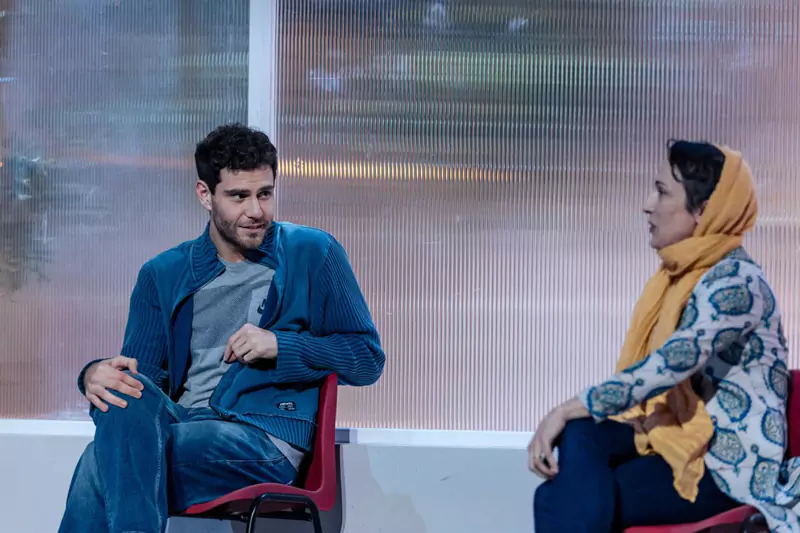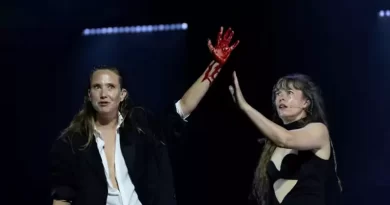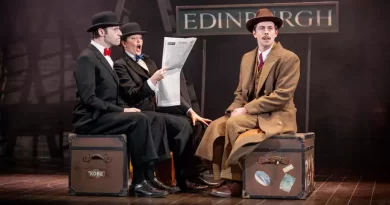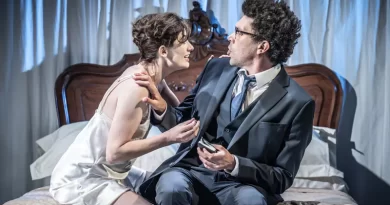“English” at the Kiln Theatre
Tom Bolton in North London
2 July 2024
English is set in a classroom of the kind recognizable throughout the world: stackable chairs, melamine tables, a whiteboard. In Anisha Fields’ set, we can only locate it more precisely because the door is open, revealing wall paintings outside that tell us we are somewhere in Asia. The class is learning English as a foreign language, studying for a qualification which, it becomes apparent, is crucial to the characters’ aspirations, whether for work, family, or personal identity. Everything, in fact, depends on being an English speaker. Failure to speak English holds you down and holds you back, even if you are only truly yourself in your native language.

Nojan Khazai and Nadia Albina.
Photo credit: Richard Davenport/RSC.
Sanaz Toossi’s play, which won the 2023 Pulitzer Prize for Drama, premieres in the UK in a production directed by Diyan Zora, in her Royal Shakespeare Company debut. The show transfers from The Other Place in Stratford, the first RSC production at the Kiln in 15 years. Following Cowbois at the Royal Court earlier this year, it is a further step towards re-establishing the RSC’s new writing presence in London. English is a pre-approved, gold standard piece rather than a risky commission, but Zora’s production gives British audiences a welcome opportunity to see for themselves what the fuss is about.
The language class in question takes place in Iran, where Toossi’s family originate. It is set in an indeterminate era when CD and DVD players are teaching technology, any time between now and 20 years ago. It is a low-key but engaging piece, in which five characters – four pupils and their teacher – interact as the course progresses revealing, to us and to themselves, why they are learning English.
The play’s underlying theme is colonization. Direct colonial rule may be mostly in the past, but the cultural power of the English language remains as powerful as ever. In countries across the world, respect, identity, employment, power are dependent on the favourable perceptions of English speakers. Toossi explores this theme with subtlety and power, cleverly using the actors’ normal accents to indicate that they are speaking Farsi, and Iranian accents when they speak English. This simple device neatly exposes the contrast between the fluency with which they express themselves in their own language and the straitjacket of a foreign tongue.
Yet the pupils have different attitudes to English. Frustrated Elham (played by Serena Manteghi) rails against the test and the teaching, but keeps coming back. Goli (Sara Hazemi) is young, adaptable, and sees possibilities rather than barriers. Roya (Lana Joffrey) is a grandmother, out of her depth but determined not to be frozen out by her émigré family. And Omid (Nojan Khazai) riles everyone by being just too good at classes. Overseeing them, the teacher Marjan (Nadia Albina) once lived in Manchester, and struggles with her cultural identity.
All the cast put in engaging performances, drawing the audience into the group’s dynamics. Many scenes have wit and charm, and are clearly based on a deep understanding of what it feels like to never belong, either in Iran or in the West. The play’s perceptive politics are its strength, but Toossi’s plotting and character management is less so. While the set-up is fascinating, very little that is unexpected happens in the play and plot development sometimes seems written too much by numbers. The sexual tension between Marjan and Omid does not tell us much, and the abrupt disappearance of Roya who, like the Fool in King Lear, is never mentioned again seems odd. The play is traditional in form, telling its story from start to finish through characters who mostly talk around a table.
English gives us plenty to think about. However, the lack of any reference to the situation of the characters, particularly the women, within Iranian society creates a gap in our understanding of what is really happening, or how people make decisions about their lives. The production also leaves us seeking a level of disruption, challenge, or experimentation that is absent, to give us the sense we have seen something truly unexpected.









